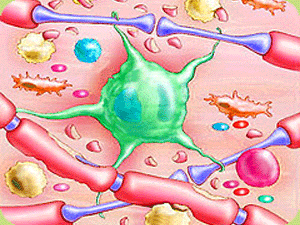a case of mistaken identity
 The main function of our immune system is to defend the body against viruses, bacteria, fungi and other foreign invaders. It is a complex network of highly individualized cells that patrol, identify, attack, and remove cellular intruders. Autoimmune disease occurs when these specialized immune cells mistakenly identify the body’s own cells as foreign invaders and uncontrollably attack the body’s own tissues. Autoimmune illnesses include, among others, systemic lupus erythematosus, Type 1 diabetes mellitus, rheumatoid arthritis, psoriasis, multiple sclerosis, scleroderma, pernicious anemia, myasthenia gravis, Grave’s disease, Hashimoto’s disease, Crohn’s disease.
The main function of our immune system is to defend the body against viruses, bacteria, fungi and other foreign invaders. It is a complex network of highly individualized cells that patrol, identify, attack, and remove cellular intruders. Autoimmune disease occurs when these specialized immune cells mistakenly identify the body’s own cells as foreign invaders and uncontrollably attack the body’s own tissues. Autoimmune illnesses include, among others, systemic lupus erythematosus, Type 1 diabetes mellitus, rheumatoid arthritis, psoriasis, multiple sclerosis, scleroderma, pernicious anemia, myasthenia gravis, Grave’s disease, Hashimoto’s disease, Crohn’s disease.
While there are many theories as to what causes autoimmunity, it is generally acknowledged that genetics and environmental toxins (ie viruses, bacteria, chemicals) play a role, with both needing to be present before the autoimmune disease process takes place. There is debate however, as to how much hereditary genetics play a role and whether DNA mutations are actually caused by environmental insults alone.
In his book Herbs For Hepatitis C and the Liver, Stephen Harrod Buhner offers the fascinating theory that viruses have taken snippets of bacterial DNA, and over time, interwoven them into our own DNA. Then, if we ever are infected by that original bacterium, our immune system launches an attack and creates antibodies against the bacterial DNA which is now manifested as “self,” causing autoimmune illness.
There have also been studies examining the link between the estrogenic effects of organophosphate pesticides like Chlordane and autoimmune illness. Petrochemicals—like those in plastics used to make some artificial implants—have also been implicated in autoimmune response. Silicone breast implants have been associated with an increased risk of autoimmune illness as well.
No matter what the cause, conventional treatment for these illnesses is most often offered in the form of pharmaceuticals (eg steroids) that suppress the immune system, perhaps slowing down the progression of disease and helping to manage symptoms in the short term, but not addressing the root source of illness. They also pose the risk of adverse side effects and additional symptoms that may develop after long-term use. This is the general problem with mainstream healthcare’s bandaid approach to symptom management: it may keep the sufferer dependent on treatment with drugs for life, without ever resolving the core issues, and more often than not, adding to the original problem with new or exacerbated symptoms.
At Planet Thrive, we believe that the first line of defense for anyone that finds they have been slipping into a state of “dis-ease” should be to focus on diet and lifestyle issues in order to remove toxicity from the body and alleviate excess burden on the immune system. Since stress and mental outlook are known to contribute to disease, we promote a holistic, multi-pronged approach that addresses imbalances in body, mind and spirit. Illness should not initiate the all-too-common pill-popping response of our fast-paced modern culture; rather, it should be recognized as a wake-up call alerting us to re-evaluate our lifestyles and determine what is not contributing to health. We believe that deep, sustained lifestyle changes are needed to overcome disease and maintain good health, and to that end we provide the information and community to support those changes.
AUTOIMMUNE ON PLANET THRIVE |
| latest autoimmune news | autoimmune websites | treatment protocols | diet and nutrition | mercury poisoning | yeast killers, enzymes, probiotics | herbs | disability benefits | legal services |
|
RESOURCES WE LOVE! |
websites  
|











